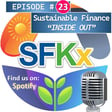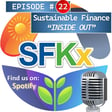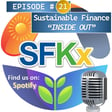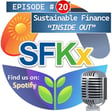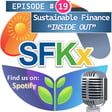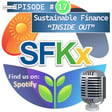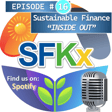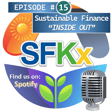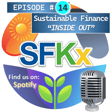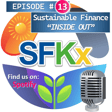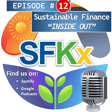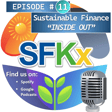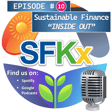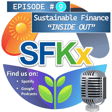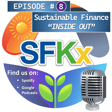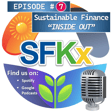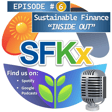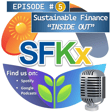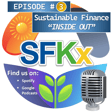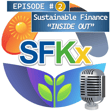Become a Creator today!Start creating today - Share your story with the world!
Start for free
00:00:00
00:00:01

SFKx Podcast Ep. 4 - Sustainable Finance "Inside Out"
Transcript
Introduction to SFKX's Sustainable Finance Podcast
00:00:08
Speaker
Hello and welcome to number four edition of SFKX, sustainable finance, inside out podcast. Now, for those who don't know, once again, SFKX knowledge exchange, we're essentially a media and training initiative. And we think that's one of the most exciting ways to share this information is what we're doing here, podcasts, tweets, blogs. So keep checking us out and keep, keep following us, please.
00:00:33
Speaker
Now we're going to bring you the best news, the best stories, all the breakthroughs, all the key concepts, all the happenings in this area of global finance. I'm not going to hold things up because my mate SFGuru, SFDJ by the way, is really keen to get you the latest happenings around the place. So SFGuru, over to you mate.
Podcast Updates from SFGuru
00:00:56
Speaker
Thanks SFGJ and good morning, good evening, good afternoon to all of our listeners.
00:01:02
Speaker
There has been a bit of a break between our latest podcast, a few school holidays and things were on the cards. So let's dive straight in and we'll be coming out with a few episodes pretty rapidly over the next week or so. So as they say in the classics, hold on to your hats for those.
Global Events and Climate Impacts Discussion
00:01:21
Speaker
So SFDJ, just sort of moving into the news, there's been a lot of stuff happening at the moment.
00:01:29
Speaker
Again, from a few weeks ago, fires in Maui, issues in China, property markets, that's a big contributor to the green bond market. Pretty, pretty interesting sort of markets all over the place. We're not going to get too much into, you know, forecasting and things, but the point I wanted to make was we're really seeing the impacts of climate in front of our face now. And I think, you know, even issues such as the Fukushima water and debates around that.
00:01:58
Speaker
and then impacts of some people wanting to not eat seafood in Hong Kong. It doesn't matter what side of the debate we're on, but what matters is these things are really getting in front of our eyes, in front of our face, which means change is upon us and we have views on these things.
Trends in the SLL Market
00:02:18
Speaker
The more sustainability thinking we do,
00:02:20
Speaker
the more it gets integrated to companies, the more then it gets integrated and spoken for in terms of financing. So, yeah, just really interesting times. Just to jump to the SLL market, it's something that sort of crept up on me a little bit. When we did our half yearly sort of updates and first quarter updates in previous podcasts, we didn't really go into the SLL market because we didn't have enough data at the time. But
00:02:44
Speaker
What's actually happened is there's been a bit of a slump there. So if I've somewhat misled or glossed over that in terms of assuming the SLL markets as high as previous years, that's actually not the case. So I've seen about a 70% reduction in the first eight months this year. And primarily that was because I think a lot of companies were stockpiling cash, stockpiling contingent facilities, stockpiling revolvers over the COVID period. Generally those can be for a couple of years on the revolver side.
00:03:14
Speaker
And there hasn't been as much to refinance, reset, redo this year. So I guess SLL's a little bit probably from the cloud or the shade, I should say, of what's been happening in the SLB market or link bond market and the challenge to some targets and things. But I think that the loan market is just a little bit more cyclical and sometimes
00:03:37
Speaker
you know, the period of which people don't need to refinance can be a little bit longer there. So anyway, just something interesting to look at.
CBI's SLB Methodology Document
00:03:45
Speaker
Something that I really was keen to share SFDJ was I think something that didn't really get noticed in the market was that great friends at CBI Climate Bond Initiative often release a lot of material and sometimes we don't sort of look into it. One thing that was released that I really liked and would encourage people to read it was a
00:04:04
Speaker
a methodology for how SLBs or linked bonds will be included in the database that they put together. Now, the interesting thing about that was it gives an insight as a key think tank to the market and what they believe should or shouldn't be in an SLB. They actually tell us.
00:04:23
Speaker
From the methodology i'm focused a little bit narrowly i think i'm ggs i want off sets excluded i'm what sort of coverage i'm does emissions have so some of these are criticized is only have a small percentage of coverage of overall ggs and this one's about eighty percent,
00:04:43
Speaker
sort of coverage they're looking for. And then they have the three categories of fully aligned SLB to science-based targets based on specific GHGs. GHGs are not the only way to cut some of these deals. Strongly aligned, aligning and SLB not aligned. So really check that out.
00:05:04
Speaker
And the most interesting thing for me is the expectation that at least 80% coverage of emissions across the different scopes needs to be covered. So another good resource for the banks to have a look at to say if a deal wants to be included in that database, this is what they need. I actually spoke a little bit too soon as well. That coverage of emissions actually differs by sector. So there's actually a sector table as well. So forest land in Agri, one, two, three.
00:05:35
Speaker
Steel, scope one and two. Real estate, scope one, two and three, or 80% of total emissions. So more accurate to say would be there's a nice little graph of different industries. And that's just a really good basis and reference point for us to look at. Moving right along, Natexis continue to do some excellent research. They do a great monthly newsletter. I'd encourage all of our listeners to
00:05:58
Speaker
to check that out. I noticed a really cool piece about energy transition and water management and biodiversity and the investment needs for that, perhaps 4% of GDP over a very long period globally, 20 to 30 years, year in, year out. So have a look at that because it tells us, it's a shopping list. Sean Kidney from CBI often talks about taxonomies being shopping lists for future expenditure.
00:06:25
Speaker
expenditure can require funding. Funding can then be integrated with sustainability. So do check that out.
Reports on Sustainability and Corporate Commitments
00:06:35
Speaker
What else have we got here? More confidence in social bonds. Again, more difficult to structure. They've been down in terms of volumes this year. Look out for those. Interestingly enough, Shell, I think a CEO, left for other reasons, non-sustainability related.
00:06:55
Speaker
What was interesting was the silently abandoned 100 million a year offset projects of planting forests all over the place. So, you know, that's interesting for some of these big market players maybe deciding that some of these more indirect things, whilst OK, going into the heart of what their issues are is possibly a better way. Sovereign issuance continues to power along, which is great.
00:07:19
Speaker
Biodiversity continues to be a key issue. In the next podcast, we'll talk about the launch of TNFD, Task Force for Nature-based financial disclosures. I hope I've got that acronym correct, SF DJ, but it continues to be an issue.
00:07:34
Speaker
It's great that it's on the radar because on the radar, it means it's going to get integrated into transactions and where it gets integrated into transactions, the money goes where the mouth is, which is, uh, which is good. And WWF continue to come out with some pretty interesting, um, pieces and a discussion about nature positive by 2030 and new initiative as well. Um, so check, um, check that out. ERM came out with a pretty interesting report. Um, and I just wanted to read,
00:08:03
Speaker
one of the couple of main conclusions from that. While the global economy is uncertain, corporate sustainability commitments remain strong. I think that's a good comment and pretty true in most places. Geopolitical and economic admins keep companies on a tightrope, but have not diminished their sustainability resolve. Again, summarizes a whole lot of what we know about corporates. And that's great. That means they still have a resolve and commitment. Once that's there, it gets integrated in the strategy and financing is an extension of strategy, which we talk about today.
00:08:32
Speaker
Something else, SFDJ, which I really liked that was released over the last couple of weeks, it was noted on the environmentalfinance.com website, was an organization, orgs, or valuebalancing.com, a little bit odd.
00:08:50
Speaker
That name was about impact accounting.
New Impact Accounting Method
00:08:53
Speaker
And I think this is really a game changer. There's no consistent way to codify impact because it's a bit of a nebulous concept. You've got things like IMP ways to think about impact.
00:09:06
Speaker
But there's no real firm way of how to do that. And there's been ongoing attempts to try and start to label this or codify it in terms of an accounting basis. So that article and that paper, I think, is excellent. There's some great stuff in that talking about going from inputs to outcomes, talking about how to codify
00:09:28
Speaker
impact and all about at the end of the day being the entities, the causal relationship between an entity's activities and related changes in people's wellbeing. How do we codify it? How do we measure it? And there was some suggestions in that and even starting to bring it into a more
00:09:44
Speaker
accounting sense and impacts on things like material conditions, income, wealth, jobs, housing, quality of life, health, work-life balance, personal security, those type of things. I think we're going to get much more familiar with this type of vocabulary and language.
00:10:00
Speaker
Bonds, loans, sustainable finance, great. But if we can keep stretching that into impact and then we're going to all come up the curve on what impact language should we be using? What accounting basis can we start to get a lot more granular on those impacts? I think that's all great stuff. So do check that out. A connected piece, Japan FSA talking about guidelines on
Japan's FSA Impact Investing Guidelines
00:10:22
Speaker
impact investment. So this impact theme really, really strong undertone in many of the more progressive
00:10:28
Speaker
markets, ongoing debates about SFDR, what should or shouldn't be included, how we should or shouldn't label funds, more issues about heatwaves. And that was back to the first comment I made in the news sections. Those heatwaves, again, sustainability issues right in front of our face. I think that drives change. So that's exciting. Articles about methane, more articles about coal buyouts in a subsequent
00:10:55
Speaker
Podcasts will talk about the MAS's new paper on carbon credits and how to assist on some of the coal buyout structures that have been floating around for a while. Scope four is something in terms of avoided emissions that'll creep into that that's starting to get discussed again. Look, they're probably the major things. One last one
ICMA's Sustainable Blue Economy Guidance
00:11:19
Speaker
before we get overdosed on news and I can hand the mantle back to yourself.
00:11:24
Speaker
SFGJ is IKMA came out with a finance, the sustainable blue economy of practitioners guide, which is thematic guidance on use of proceeds instruments, referencing some KPIs. I'd highly recommend our listeners to check that out because there's some great guidance in there about thinking, you know, green is blue, blue is green at the end of the day.
00:11:49
Speaker
What environmental projects from a blue perspective can we include in this whole space? And there's a whole set of tables, coastline, climate adaptation, marine ecosystem management, sustainable coastlines, marine value chains, marine renewable energy. Really, really good examples and practical work. Again, nothing earth shattering in terms of, yeah, blue bond, similar thing to a green bond.
00:12:19
Speaker
envisaging and codifying and tabling up what we can finance under blue, I think is excellent. Couple of interesting points about greeneums or non-greeneum. CBI has come out with the latest report, which we'll talk about in the next podcast. Allianz Bernstein, I'm sure I've messed up that pronunciation, had a bit of a paper on unpacking premium decline. Lots happening in the markets.
00:12:48
Speaker
As I always say, SFDJ, the strategic intent over the transactional specific basis points benefits is really where we want to see sustainable finance at, but those other things catch up over time. So that's really the main news. A couple of other good papers worth mentioning, the IEA
00:13:10
Speaker
have come up with some really good reports about clean energy transitions and about different costs of things around EVs and vehicles.
Reports on Clean Energy Transitions by IEA and ARENA
00:13:19
Speaker
Check that out. Renewable power costs from ARENA.
00:13:23
Speaker
have also come out with some pretty interesting papers. So some really good reference points. So I better take a breath SFDJ and that takes us through the main sort of news that occurred over our recent holidays. But again, new podcasts coming out pretty quickly next week as there's been a lot happening in the markets.
00:13:42
Speaker
Wow, wow, wow, SFGOO. What a full board of news. Pretty much the full gamut there. We covered all sectors, all countries, all regions. Talked about ICMA once again, always a good one. So thanks for that summary, SFGOO. As you take a breath and have a bit of a sip of your Pepsi Max. Look, we always cover off the various sectors, so link transactions.
00:14:07
Speaker
And that has been some movement in link transactions, some highlights. If you've had a bit of a breather, can you maybe take us through what's happening in that space? Yeah, absolutely. And look, I'm not imparted with Coke Zero either there. SFR, DJ, a bit of a caffeine hit is always, is always good. Anyway, I'm the link side. And you have any sponsorships too, by the way. So if Coke or Pepsi, and I suppose, and sponsorships as well as our way. Absolutely.
00:14:30
Speaker
We should get some new sponsors for the podcast to come in and shower us in beverages. Anyway, look, a couple of things on the link side. SDI tech related to infrastructure, social, scope one and two, using a revenue as a denominator basis for their one KPI. Again, using revenue is not the best, but in a diversified business, it can still work. Ideally, one absolute sort of reductions or intensity based on production rather than revenue is one way to look at it.
00:15:00
Speaker
Telco Orange came out. Again, a lot of Telcos in previous years have done use of proceeds and have really come out strong on the linked side. Absolute reductions in one, two and three. Ramsey participating in the SLL market, I think even SLB as well on that sort of health side. More Bremsi over in, I think, Germany. I'm pretty sure they do train doors or train infrastructure.
00:15:26
Speaker
SBTI approved targets for value chain. This one was interesting in that I haven't quite figured this out, but I think it was a really short date of which to actually get an SBI approved target on scope three coverage type levels across suppliers. I think the target was to get that in place and had a pretty short
00:15:52
Speaker
period in which to achieve that. So that was sort of slightly sort of stuck out, but I may have misunderstood how that was put together. But again, I would say that if targets are set up and they're too short, bit of a question mark, was that a realistic target? Is it a stretch? Why is it put that way? Check it out. What else have we got here? Another interesting one, Nordea have been very active, both underwriters and then and then issuers in their own right have come out with a with a bond.
00:16:22
Speaker
The coupons are not linked to funding underlying SLLs, but it's a little bit different. BOC came out with one a couple of years ago, which was a relink bond in terms of a bond coming out to fund underlying SLLs. The coupon adjustments on the SLLs would drive the coupon on the bonds. In this case, from Nordea, it was really just to invest in this bond, and this is where the money is going to go, and this is the impact it's going to
00:16:49
Speaker
It's going to generate. So we haven't seen that catch on as much across the market, but I think we're going to start to see this. We're going to use the money for use of proceed ish coming in, but then linking back to other instruments, you know, let's see.
00:17:07
Speaker
Grupo, Porto Arto, Del Pacifico, sounds like I'm working at Nando's. Airport came out with a transaction. OLAM also on the agricultural side, although I couldn't find the specific KPI. So yeah, some pretty interesting sectors and different types of structures we've seen on that linked side, SFTJ. Nando's or Tycho Bill, I think was either one of those places you were working at with that accident before
00:17:35
Speaker
SFGUR, so you've done pretty well there. So thanks for taking us through the linked instruments. Now we'll jump over to the other side of the fence.
Global Progress in Sustainable Finance Frameworks
00:17:42
Speaker
All activity-based we know, which is the use of proceeds. So no doubt there's been some activity in the use of proceeds. Oh, sorry. I'm just getting confused here, SFGUR. Use of instruments, I should say. Use of proceeds, use of instruments, sorry, altogether. Can you take us through that area next, please? Yep, use of proceeds. That's correct. I think you might be thinking about the NANDOs I just mentioned before.
00:18:04
Speaker
Look, pretty active again on the sovereign side. Singapore planning to do another bond. Brazil thinking about an SLB next year. And then the banks pretty active too. You've had Vakiflar, Bankasi in Turkey.
00:18:22
Speaker
You've had Mizzoujo, you've had Spurbank, we've had Abu Dhabi Commercial Bank, we've had Bank of BOCOM, mostly as we know on that use of proceeds side, pretty diverse framework, so check those out. Property again, another mainstay, digital realty, housing development board in Singapore, Hero Asia Investments, I think related to property. Then if we look at utilities again,
00:18:52
Speaker
a bunch of companies issuing their Eon, Elchem, those sort of companies. We saw a transition bond, interestingly enough, from Stillmaker JFE over in Japan, and Japan's being the most progressive globally labelling watts.
Transition Bonds in Hard-to-Decarbonize Industries
00:19:09
Speaker
transition versus what's green. And I guess in industries that are very difficult to decarbonize and need some interim solutions along a long technical sort of pathway of deployment that, you know, that makes sense. Data centers, air trunk, doubling sustainability link loan, construction over in Hangzhou, Shengcheng District, urban construction, that's a mouthful, shipping,
00:19:34
Speaker
Olsen doing something else there, some storage, some water, some logistics, a bit more property. Tunnel on the Thames, we could probably make a few jokes about series in terms of that one related to a few interesting things there over in the UK. What else have we got?
00:19:51
Speaker
airports, again, Atlanta, this one on a use of proceeds basis, Rexel, in terms of a big oil and gas company. Again, not everyone's cup of tea, but we just convey what's happened in the market. They had a scope three target of about 45% reduction, but the baseline was 2016, question mark, I guess. Using revenue, again, question mark, you'd rather that overproduction, probably.
00:20:21
Speaker
and then a scope one and two at constant scope. I don't quite know what that means. Again, 2016 baseline, tons of CO2 as an absolute sort of target. So check that one out. Again, some of the oil companies are more progressive in terms of exactly how they're reducing emissions. Some are sort of dancing around. It's good that we're entertaining in
00:20:43
Speaker
engaging in these type of companies. But some of those deals are not everyone's, everyone's cup of tea. I've been a fashion side, you'd be glad to hear SF DJ some new sneakers for you from, from H&M deal there and really focusing on the social side. RE, RWE,
00:21:00
Speaker
uh... excel credit on the social side and then in the role of uh... on the lawn uh... greenloan side and symbiotics interestingly enough as a as a microfinance investment vehicle structuring up some some bonds instead of you know blending through its operations to a microfinance entity uh... structuring up and raising a uh... bond so you have pretty interesting stuff on the use of proceeds with some you know different sectors and not everyone's um...
00:21:26
Speaker
not everyone's cup of feet and I've just realized the deal that I mentioned before for Rexel should have been in our SLL part rather than use of proceeds. So I apologize for that, I probably got a bit too excited about some of the aspects of that one. But yeah, back to you SFR DJ.
00:21:44
Speaker
I wanted to take a few points off for that last stuff up. That's okay. So we've covered off everything there from sewerage to sneakers, to storage, to shipping. So all the S's, a full gamut. Now, listen, we've almost at the end of our podcast. So we know that will disappoint some people, but we do have time for one more, just one FAQ today.
The Role of Heat Pumps in Energy Transition
00:22:03
Speaker
So this is a bit of a funny one posed to us by Murray, our bot. Hopefully I'm gonna ask this in the right way. We don't get any cute answers, SFGOO. But what is a heat pump?
00:22:15
Speaker
Yeah, so it's something I had to look up because I kept seeing all these articles about heat pumps, and I sort of get what they are, but I thought it's worth mentioning that because it's a big area in terms of energy efficiency that we're going to see and more used, somewhat industrial, but more in homes, trying to change from
00:22:35
Speaker
different types of air conditioning and gas and boilers and other things. So it's a really cool article from IEA. And again, if we're talking shopping list of where money is going to be spent and needs to be spent on more energy efficiency, different heating solutions, because that still creates a lot of GHG.
00:22:50
Speaker
This is on the shopping list. For bankers, people are going to buy this stuff, structure around it, a good area to lean into. It's a similar tech that's found in a refrigerator. It basically extracts heat from a source such as surrounding air, geothermal from the ground or nearby sources. Basically, it takes either heat or coolness out of the air and then reverses it into the home. It amplifies and transfers heat
00:23:16
Speaker
transferred rather than generated, and they're far more efficient, three to five times more efficient than our normal sort of air conditions and things. I don't know why more people don't have them. I don't know what the paybacks are, but if they're three to five times more efficient, and pricing of energy keeps going up and being volatile at some honest, I think it's something worth looking into. And that's why I mentioned it. I think we could see securitization for these, we could see programs for these, you know, Europe, we're going to see, we're going to see more. So again,
00:23:46
Speaker
transferring air, whether that's from the ground geothermal or whether it's from the air, and then converting that, taking the heat out or taking the coolness out. So yeah, pretty cool, pretty cool stuff. The other one just quickly, SFDJ was in relation to scope for emissions.
Exploring Scope Four Emissions
00:24:02
Speaker
And I think that's going to, yeah, no worries.
00:24:06
Speaker
Yeah, that's going to tie back to probably what we'll cover in the MAS coal buyout related paper. I mean, scope four is being talked about as a avoided emissions category. Hey, we didn't do this. Hey, we stopped something happening and that avoided X. So I think I think that's something we're just going to hear more more about. I think WRI World Resource Institute can claim coining that phrase, but
00:24:34
Speaker
The technical definition I've got here, emission reductions outside value chain life cycle product referred to as avoided emissions. So who knows? We might see some SLBs related to, related to helping companies avoid not polluting. Who knows? It could be a new branch to get into and look at, but I guess the, the overall GHG protocol has been around for 20 or so years. It probably needs a bit of a touch up. I don't know if scope four is going too far, but any emissions that we don't have,
00:25:03
Speaker
that we stop, and there's some intentionality around that, why not codify it, figure it out, but not at the cost of stopping real emissions? Because if we all run around saying, we've avoided this, avoided that, and keep emitting at the same rate, it doesn't actually help us. Anyway. A bit like going on a diet, is it in saying I'm not going to have that chocolate doughnut, so therefore I've avoided
00:25:25
Speaker
You know, they're sugar and calories anyway. It's a bit tough. Yeah, it's out there. But look, I think like a number of different elements of sustainable finance, debt to nature swaps, carbon credits, these type of things are just going to get integrated. And I think that's okay if it drives the right behavior. If it's just stopping something, a donut that you would have eaten anyway, or, well, what are you doing in your real operations? You know, if it's complimentary,
00:25:54
Speaker
If it's supplementary, if it really drives a behavior change and net-net we're better off, why not? But I guess that's when the jury's out on those sort of structures. Anyway, SFDJ, I think we're nearly at the home stretch. What else have we got before we finish off? We've got one more little box to tick off, and that is basically about products and programs.
Emergence of Green Banking Products
00:26:13
Speaker
Now, there's always something to talk about in this space. What have you got for us in terms of products or programs that integrate sustainability into our day-to-day?
00:26:22
Speaker
Yeah, and for our audience, I guess it's more of the same. So is that disappointing? Yeah, maybe yes and no. I think, look, banks overall want to integrate sustainability considerations and more and more products. But I wouldn't advocate doing that as a gimmick. I would advocate doing it where it can cause a behavioral shift and an actual change. Good stuff.
00:26:43
Speaker
What have we got here? Comm bank launching first green home loan scheme somewhere. I can't remember exactly where. So again, homes, green homes, better interests, more efficient homes. Islamic finance, again, very heavy in the Middle East and places like Malaysia, as far as Asia is concerned, just talking about those, how it can fit into the scheme of things. Again, having that menu of different
00:27:10
Speaker
instruments that connect to sustainability and drive the same outcomes, why not? Bring it on. What else here? A little bit of discussion about in terms of regulations, the EU green banking metrics and those sorts of things. I hope that doesn't derail anyone's programs. And then ECA is export credit agencies. Again, export credit agencies supporting the major exports from their market. And if that equipment is driving recycling, increase in energy efficiency,
00:27:38
Speaker
Why not label it green? They're big. They're important. And we've seen a real smattering of issuance in that ECA sort of markets over the last few years.
Podcast Wrap-up and Next Episode Tease
00:27:48
Speaker
So just ongoing discussions about how we can leverage that up, how we can do more, how the banks can say, hey, ECA, help us on these transactions. Let's label them green. Let's really build more momentum.
00:28:01
Speaker
So I'm definitely out of breath now, SFDJ, and back to you to wrap us up. And we look forward to engaging with our listeners again on our next podcast, which will be hot off the press in coming days. It's a nice segue. You actually correct. That does bring our fourth episode to a close. I can't believe we've done four already. The number four in numerology, mind you, does mean no nonsense with a heads down approach to life and work. So this certainly seems what this podcast number four has been about. A heads down approach to life and work. Anyway,
00:28:30
Speaker
Thank you once again. Go to our website, www.sustainablefinancekx.com. From there, you can see all the articles, see all our blog posts, and also find your way to all our socials from that website. So, sustainablefinancekx.com. Thanks again. I've been SF DJ, my mates been SF Guru. Yeehaw! We forgot to yeehaw today, so I at least better get one in at the end there, SF DJ. Yeehaw! All right.
